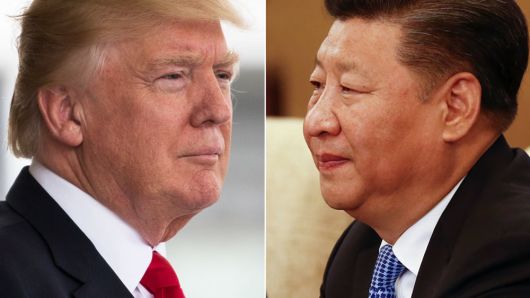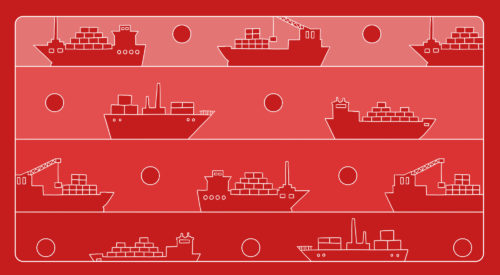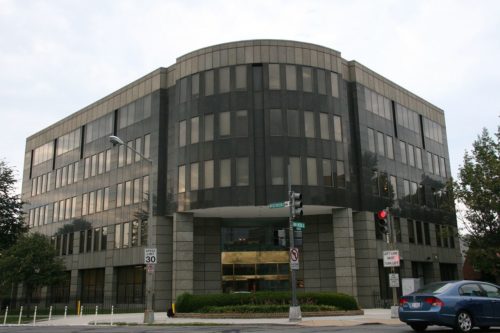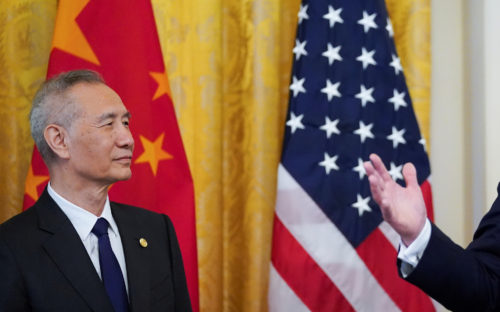Trade war, day 125: Pessimism surrounding U.S. elections, Singapore summit steals Shanghai trade fair’s thunder


Any hopes in Beijing that Democratic Party gains in the U.S. midterm elections would have some beneficial effect for China on trade issues are looking dim. At best, things won’t get any worse.
- “Partisan Democrats traditionally have been the more protectionist party while Trump Republicans are extremely hawkish with regard to everything relating to China,” David Adelman, former U.S. ambassador to Singapore, told CNBC. And, in any event, the power to impose tariffs remains an executive privilege, even if there was greater support for Democratic candidates “visible in other parts of the country considered to be particularly vulnerable to fallout from the trade war.”
- The pessimistic tone at the Bloomberg New Economy Forum in Singapore looks to be overshadowing the positive spin and hype surrounding Xi Jinping’s trade fair in Shanghai. Former U.S. Treasury secretary Henry Paulson warned of a looming “economic Iron Curtain” that threatens to fall between the U.S. and China.
- Paulson, a longtime optimist on American engagement with China, said he is “very sobered by the trajectory we are on now,” and called for a greater commitment by China to reform and opening up while the U.S. should “dial down the rhetoric” and recognize that “China does not pose an existential threat to American civilization.” He added:
If the U.S. and China cannot find a way to develop a workable consensus, it will pose a systemic risk of monumental proportions — not just to the global economy, as I dealt with, but to international order as we know it and to world peace.
- Meanwhile in Shanghai, the China International Import Expo, part of Xi’s response to the trade crisis, claims to have attracted 400,000 buyers, including “representatives from nearly all of China’s state-owned enterprises.” However, it’s not clear how much the buyers are actually buying, or whether deals would have taken place without the expo. The Wall Street Journal (paywall) notes that more than 180 U.S. firms are attending, but their CEOs are notably absent amid the trade war.
- American executives are also reported to be skipping China’s big technology powwow in nearby Wuzhen, which in previous years boasted attendance by the heads of Apple and Google. “Foreign tech firms might feel that under the current political environment, it’s not ideal to be seen as overly cozy with China,” Mark Natkin, managing director of the Beijing-based Marbridge Consulting, told the Financial Times (porous paywall).
Other trade-war-related news:
- Technology
China’s ties with Taiwan chip firms under scrutiny in trade war / Asahi Shimbun
A major Taiwanese chip maker cut ties with its Chinese state-backed partner Fujian Jinhua Integrated Circuit after the U.S. alleged that Fujian Jinhua stole trade secrets from an American firm and barred it from U.S. supplies.
Chinese police seize fake iPhones as trade war with US moves tech theft centre stage / SCMP
“Police in Shenzhen seized about 500 fake iPhones from a workshop believed to be part of a larger organization that produced counterfeit Apple products.”
- Follow the money
Watch out — cash is deserting China again / WSJ (paywall)
“The Trump administration has spent much of the past year arguing that capital leaving China was a sign of flagging confidence, which would enhance the U.S.’s leverage in trade talks. Until recently, there wasn’t much evidence that was true.”
China’s reserves fall, suggesting Beijing propping up yuan / AP
Yu Yongding: Trump’s trade war may end up helping China rebalance economy / Caixin
- Consider the lobster
Even lobsters can’t escape Trump’s trade war / Bloomberg (porous paywall)
“Dealers in Maine have begun investigating whether to open bonded warehouses so they can sell Canadian lobsters to clients in Europe and China, bypassing tariffs.” - More voices
U.S. must ‘figure out a way to work with China’ / The Asahi Shimbun
“Susan Thornton was acting assistant secretary of state for East Asian and Pacific Affairs when she resigned in July in the face of pressure from the Trump administration, which considered her too accommodating on China.”
Cohn sees no ‘instant cure’ on U.S.-China trade after midterms / Bloomberg
Previously in The China Project’s trade war coverage:





